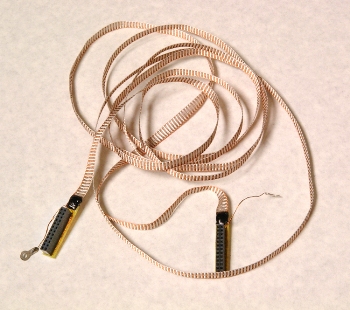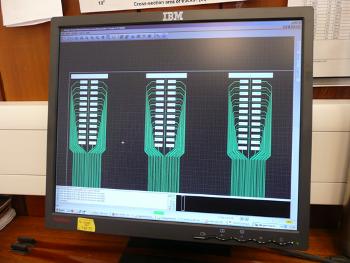Cabling
As part of the CRESST II readout system we required
cables to read out the SQUID sensors; supply the bias and heater signals
to the detectors; and connect the SQUIDs to the detectors. We achieved
this using woven cables supplied by Tekdata,
made to our design. The cables are designed to minimise the heat
load, while ensuring that crosstalk and susceptibility to external
electromagnetic interference remained very low. Some of the wires need to
have a low resistance, thereby presenting a significant heat load to the
helium main bath.
The woven cables consist of twisted wire pairs woven with an
insulating thread; the pairs are twisted in alternate directions
(clockwise or anticlockwise) and single wires (connected to ground) run
between them to reduce the crosstalk between channels. Inside the
cryostat the cables are clamped in heatsinks to ensure there is no
heatload on the detectors. The cables running inside evacuated tubes to
the top of the cryostat (at room temperature) are clamped inside baffles
to ensure a gradual reduction in the temperature, minimising the
heatload.
To compare the crosstalk in different cable designs, we developed
software to model the crosstalk between wires. The results, shown below,
confirm that our woven cable design was best. However due to the high
cost of supplying woven cables to readout the 1000+ detectors required
for
EURECA, we started investigating alternative
designs, such as Kapton cables - metals tracks
deposited on Kapton foil. In this case the design is even more critical
to ensure the crosstalk is kept within acceptable limits.
|
 |
| Woven cable supplied by
Tekdata |
| |
 |
| Kapton cable design |
|




